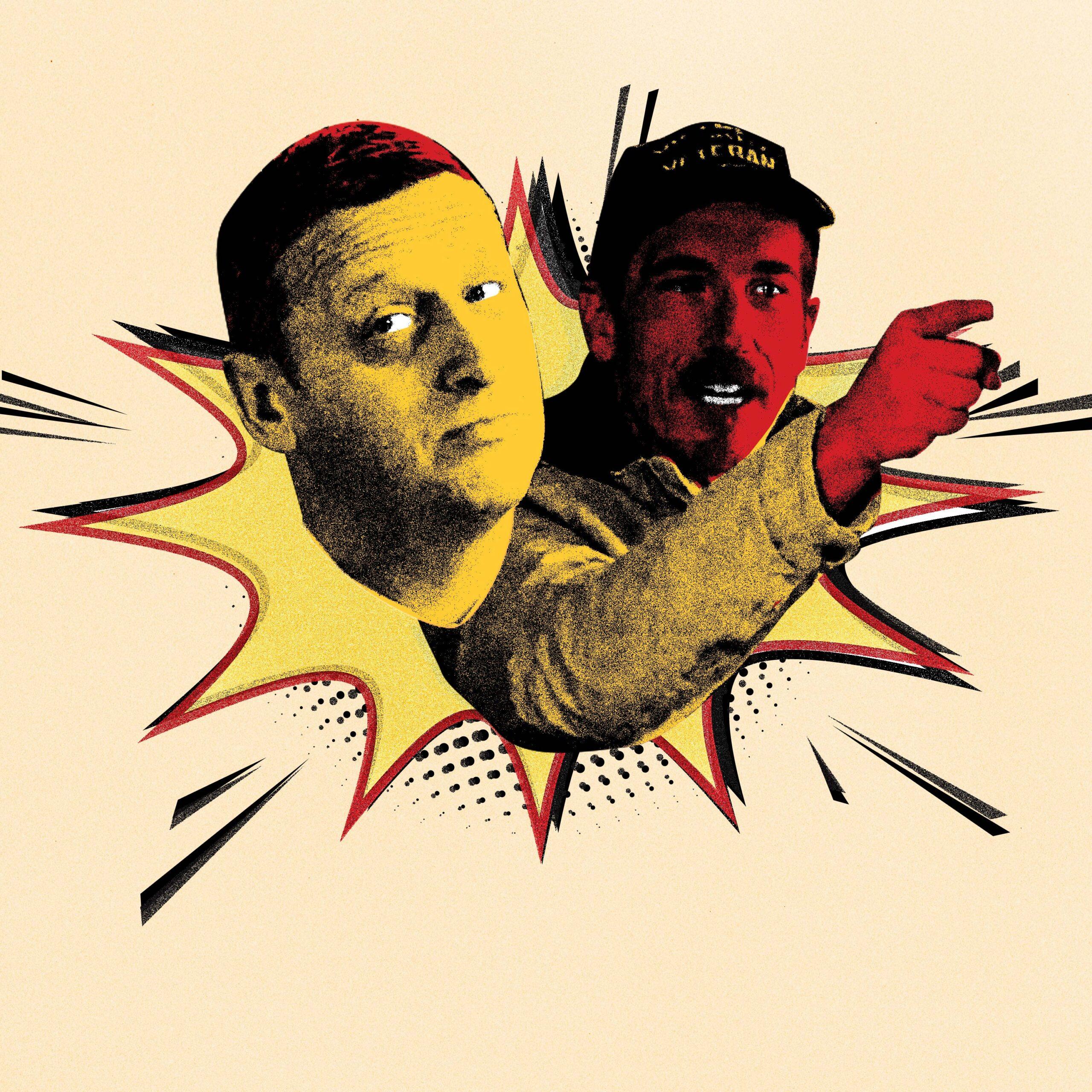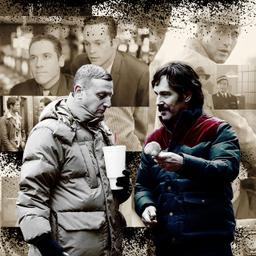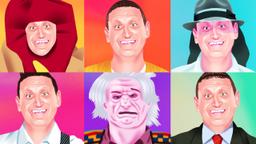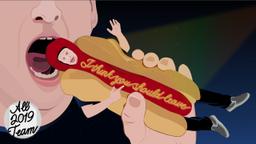
The funniest scene in a movie this year was mostly left on the cutting-room floor. About two-thirds of the way through Friendship, Andrew DeYoung’s bait and switch from bromantic comedy into harrowing cringefest, the spiraling Craig Waterman (Tim Robinson) seeks reprieve from his distant wife’s homecoming party in the form of the drum kit in his garage. In walks Patton (Conner O’Malley), a perfect stranger clad in a Harley-Davidson shirt and Vietnam veteran hat who has evidently mistaken the garage door for the bathroom door. The subsequent 90-second exchange in Friendship’s final cut is tight, effective, and fittingly bizarre; O’Malley’s Patton feels compelled to compliment Waterman’s drum kit—the green recalls the 1970s, which “economically, could have been better”—before exploding in psychosexual rage about his host’s inadequacy as a husband. Shortly after the film’s Blu-ray release, however, clips from the extended garage scene began to make their rounds on the internet; the strength of the 12-minute improvised joust is such that A24 has centered it in its marketing materials. If you’re in the right demographic—read: a man on the internet—you’ve probably been inundated with chopped-up excerpts of the back-and-forth.
This extended garage scene largely exists outside the strictures of Friendship’s plot; save for a few obvious directives, it is little more than two of the finest contemporary comedic talents jamming at the height of their powers. O’Malley, evidently tasked with driving the exchange, toggles through his by-now hallmark preoccupations: stolen valor, internet crankery, heterodox conservatism, a childlike enthusiasm for consumer products, violent revenge fantasies, and profound romantic loneliness, all punctuated by bouts of disarming screaming. Robinson sticks to what he does best in his role as de facto straight man, balancing a loud defensiveness against a so-pathetic-it’s-tender desire to be respected by another man. The two are separated by a group of shovels and a small, unframed photograph of the Situation Room on the night of Osama bin Laden’s assassination. About halfway through their screaming match, the two find common ground when discussing how rewarding it would be to re-create The Goonies as adults; O’Malley appears almost genuine when he admits that it would “be good to be a part of something,” only to break the truce by berating Robinson with what he’d do to him in prison. And so it’s not quite surprising that this clash of titans has become to the broader “dudes rock” pantheon what 2016’s LeBron vs. Warriors Game 7 was to partisans in the GOAT debate.
Both O’Malley and Robinson create art that is deeply, if not exclusively, concerned with contemporary masculinity. It feels like no mistake, then, that their most fervent boosters and fanatics are usually (although, of course, not exclusively) men. Over the past two years, the pair have evolved beyond their patented one-note absurdisms to create the most urgent art of their respective careers. Across film, stand-up, television, and web shorts, O’Malley and Robinson have sketched with similar sensibilities across a body of work that speaks urgently, empathetically, and honestly about the pathologies and insecurities gnawing at the modern man. That they achieve this in a milieu totally divorced from modern masculinity’s more odious and ascendant content creation pipelines feels like a minor miracle.
It’s hard being a dude, suggest O’Malley and Robinson, not because of some grand conspiracy of wokeness set to undermine America’s men but because it’s hard to be anyone these days.
Robinson, who followed his turn in Friendship with this year’s HBO series The Chair Company (created alongside longtime collaborator Zach Kanin), concerns himself with highly stylized sad sacks. He most effectively portrays and writes about men who are stuck in the middle—Middle America, middle management, midlife—men who crave respect and connection in equal parts. In The Chair Company, the best American television comedy since The Curse, Robinson’s loser protagonist Ron Trosper is a recently promoted mall developer whose conventional successes—stable career; supportive wife; self-assured, soon-to-be-wed daughter; hooper son; and surprisingly passable interpersonal skills—pale in the face of his insecurities and inadequacies. These shortcomings manifest themselves in profoundly Robinsonian fashion, whether through a steadfast commitment to the bit rather than admitting defeat or the dogged pursuit of individuation in the face of near-certain failure. Even the show’s plot developments, which recall True Detective and Dark Waters by way of Tim and Eric, stem from aggrieved embarrassment: Ron uncovers a wide-ranging, sordid corporate conspiracy not in the name of justice but because he wants an apology after falling through a shoddily designed office chair in front of his colleagues at a keynote.
If the golden era of television revolved around compromised yet exceptional men failing in their domestic capacities, Robinson’s Ron is a profoundly average guy sprung into action only by deep-seated grievances. Near the end of The Chair Company’s first episode, Ron searches Google for an “emotional wedding song” to soundtrack a slideshow for his daughter’s rehearsal dinner. The result, Jim Croce’s “I Got a Name,” provokes such a reaction in him that he tearily joins the fray of YouTube comments: “It really does go by so fucking fast. You think you’re gonna do something with your life and the next thing you know it’s too late.” The moment, although played for laughs, is something of a skeleton key to late-period Robinson. We’ve all read the YouTube comments of our favorite songs—some of us have even been unfortunate enough to find those songs through auto-generated search terms. Robinson, increasingly, is concerned with imagining the inner lives and governing pathologies of the poor suckers behind all of those comments.
O’Malley, for his part, is concerned with a different genre of poster. Since rising to comedy micro-celebrity on the strength of his increasingly depraved man-on-the-street and Howard Schultz–canvassing Vines and Twitter videos, O’Malley has positioned himself as an essential if heavy-handed chronicler of stylized, internet-enabled masculine delusion. But where O’Malley’s absurdist characters once evoked cautionary tales and small-town wives’ tales—think of a Brothers Grimm troll in the throes of a manic episode or a parent warning their son not to get too into sports cars—his recent, more fully developed work focuses more on the mutually reinforcing systems of shame and ideological dissemination that prime men for radicalization in the first place.
Take 2023’s The Mask, a short film that serves as both O’Malley’s career high-water mark and the most legible entrée into his newfound mastery of transforming social media’s platform interfaces and internal logics into sprawling, experimental films. After a perfunctory montage of shitposty TikToks, the film begins in earnest with a shot of Universal Studios’ Waterworld stunt show, footage of which is stylized to look like any old YouTube upload. As the music swells, the camera zooms in on O’Malley—selfie stick in one hand, Jim Carrey–style mask on his face. His character, a miserably failed improv comedian named Tyler Joseph, begins publicly espousing conspiracy theories implicating John Cena, Joe Biden, and “the Chinese CIA” as the video input toggles rapidly between front-facing camera, Facebook comment, TikTok vertical shot, and a facsimile of Good Morning America. In under three minutes, O’Malley sets the project’s stakes: How does a sweet, Whose Line Is It Anyway?–loving grandma’s boy turn into a deranged, mask-wearing conspiracist? Here’s experimental comedy with significant sociological stakes, although of course it’s still funny first; Joseph’s innocent-years montage includes one of his Pornhub comments: “Low key the house they are in is gorgeous.”
The story here is both intricately staged and relatively straightforward. Joseph is an unfunny man who dreams of comedic fame. He has the misfortune of harboring such delusions while being born into a world structured and governed by short-form video and social media, a historical accident that both deludes Joseph into thinking he can post his way into fame and creates for him an ostensibly permanent archive of him debasing himself in increasingly humiliating ways for even a sliver of attention. A series of tragedies both acute (the loss of his beloved grandmother, whom he’d enlisted for his fair share of YouTube videos; being taken in by malicious pranksters for a fake audition meant to humiliate him; a succession of scandals in the L.A. improv community) and general (the sustained psychic damage of constantly posting oneself to no audience) takes a toll on Joseph. At one point, his man-on-the-street run-in with John Mayer goes viral on r/cringe: ”This freak’s entire channel is gold!” His views skyrocket not as some endorsement of his creative output but because he, like so many of his unfortunate real-life analogues, has been cast as a lolcow. This series of cruelties—each unexceptional on its own, each greatly magnetized by the power of social media—primes him exceptionally well for the high-guy conspiracy theory his slacker Craigslist roommate (a characteristically scene-stealing Eric Rahill) confides in him while, of course, sitting on their couch. Upon learning of the “Yantianto conspiracy,” which speculates that the Chinese government is weaponizing “gaia force” to fund a global propaganda machine sustained largely by reanimated dead celebrities, Joseph abandons his careerist aspirations and sets out on a single-minded crusade to stop its machinations. It’s part Illuminati, part QAnon, part what your one coworker secretly believes; whatever it is, it’s enough to convince Joseph to stage a protest at Universal Studios and end up in police custody. For better or worse, though, it finally gets him on TV.
Through their caricatures, scapegoats, and freaks, both Robinson and O’Malley treat seriously and curiously the series of self-reinforcing fictions that both constitute and torment masculinity.
Where Robinson has a knack for the verbal tics of filibustering buffoons, O’Malley is at his strongest when articulating the fervent insistence of zealots and cranks. In both cases, though, their art is able to remain engaging, inventive, and funny rather than purely didactic homework because they operate empathetically and comprehensively. Whether in this year’s Pipe Rock Theory (a far shorter film that integrates a video podcast, TikTok pedophile hunting, and police bodycam footage of a raid on an Eyes Wide Shut–style cabal) or last year’s feature-length Rap World (an elegy to what underachieving guys were able to be before cellphones recast them as radicals-in-waiting), O’Malley fuses the eye of a cultural anthropologist with the brain of a 2010s Adult Swim programmer. As in Robinson’s work, the empathy that undergirds the project arises from the knowledge that the characters within are but one or two standard deviations from their creators’ own trajectories. There but for the grace of God go I, avers the guy who parlayed outlandish and abjectly humiliating Vines into a sustainable and creatively rewarding comedic career.
It’s hard to be a dude these days. This proposition is both simple and true; it has also sustained a booming cottage industry of bad-faith, reactionary, unsavory characters who have built profitable followings in their quest to blame forces of social progress for this fact. Both O’Malley and Robinson create art that is equal parts cathartic and clear-eyed for its ability to engage with this fact without veering into the sort of antisocial bigotry that has proved so remunerative for right-wing provocateurs, life coaches, and cultural demagogues. It’s hard being a dude, suggest O’Malley and Robinson, not because of some grand conspiracy of wokeness set to undermine America’s men but because it’s hard to be anyone these days: Well-paying jobs are few and far between, wealth is consolidated into fewer hands invested in increasingly speculative ventures, algorithmic platforms warp our perspectives and brain functionalities as they vie for an increasing share of our waking hours, and civic institutions willfully hasten their own mass extinction event. We broadcast ourselves to more people than ever in human history yet nurture fewer meaningful interpersonal connections than ever in recent memory. Just five years ago, public life as we know it ceased to exist as pandemic lockdowns plunged the country into an unprecedented period of isolation, anxiety, and technological mediation. It’s enough to drive anybody to the brink. If you’ve spent your formative years steeped in a culture of masculinity that prizes greatness, strength, and self-sufficiency; instills in you the expectation of certain entitlements; and then more or less tells you to figure it out, you’re primed to be halfway there. These things add up.
Through their caricatures, scapegoats, and freaks, both Robinson and O’Malley treat seriously and curiously the series of self-reinforcing fictions that both constitute and torment masculinity. They are interested, in a literal sense, in the performance of masculinity in a continuously degrading, paranoid, and precarious world. Their men know something that others don’t yet always end up ostracizing themselves; they are strong and destined for greatness yet will reorient their lives in the face of embarrassment; they seek companionship and partnership in equal, contradicting measure; they will interrupt an exchange of death threats to compare the merits of various streaming services. These are men who seek desperately to matter, to belong to something that will last. They crave validation and resent themselves for it. They can’t afford their boyhood dream cars, and they expect someone to apologize to them about it. They yell. You can laugh because they’re nothing like you, but you come back because they remind you of guys you know.
Perhaps the best way to understand what makes these kindred-spirit collaborators work is this: O’Malley and Robinson create art singularly capable of depicting the psychic aftershocks of a world reorienting itself after a pandemic, including its profound social disruption and tech-aided spirals, that nearly everyone else appears committed to pretending never happened. In Robinson, we see repeatedly the post-lockdown faux pas taken to its logical conclusion: the double down, the non sequitur, the explosive crash out. In O’Malley, we’re confronted with the barrage of posts, clips, and comments that now constitute our every waking minute. The two stylize and amplify neuroses that are no longer far from the average human experience. Much in the same way that most Americans live one paycheck away from financial ruination, viewers might feel but one bad break away from resembling O’Malley’s and Robinson’s pitiable protagonists. Is it so hard to imagine doubling down with pride after a missed social cue at dinner? Drifting just beyond the limits of acceptability in pursuing your latest internet rabbit hole? These characters hover somewhere between plain representation and pure abstraction; the outlines are there, and that’s why it works.
By the time Friendship’s garage scene rolls around, Robinson’s protagonist has been bitterly abandoned by his new best-friend neighbor (Paul Rudd) and his harmonizing circle of fellas; he has grimaced through abortive attempts to constitute a coworker squad in this very garage. At the moment when O’Malley’s salt-of-the-earth crank walks into the garage, Craig Waterman has most of what matters in life and precious little of what he wants. It’s in this context that he, across the explosive, improvised fight between these two outcasts, can be forgiven for sounding optimistic every time a pause in hostilities suggests that he and this valor-thieving stranger have something in common. Life is easier once you find someone who’d like to do The Goonies, too.


